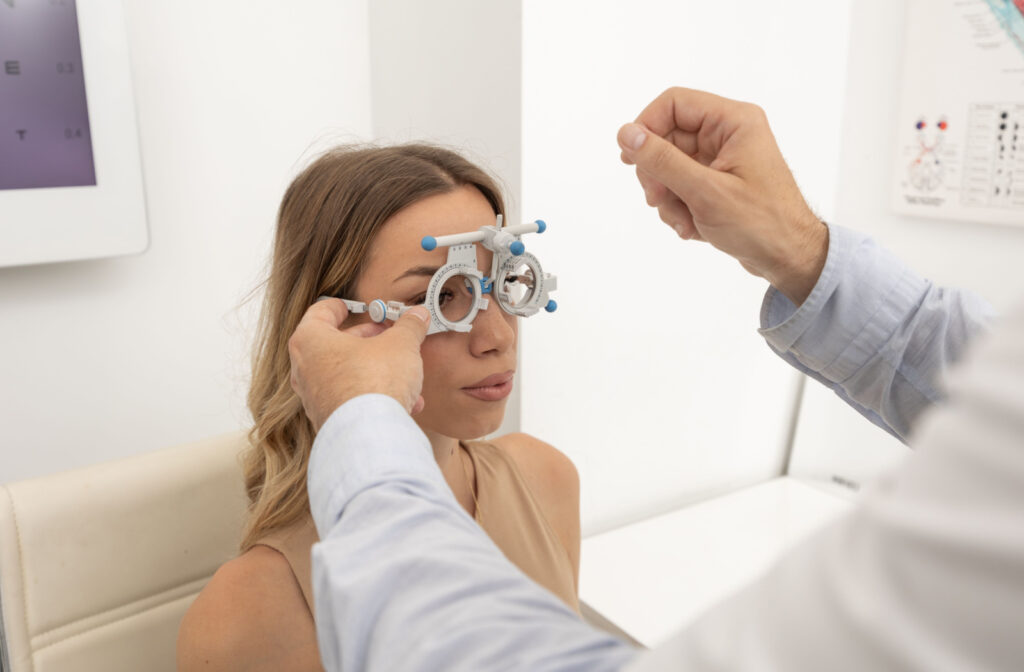The human eye is a wonderful thing. It lets us see and interact with the world around us, but it isn’t always perfect. Sometimes, certain eye conditions can sneak up on us without realizing it. Regular eye exams are important for catching issues before they become big problems.
Peripheral vision loss, also called tunnel vision, is a medical condition recognizable by the inability to see objects in your side field of vision. Underlying conditions often cause it and may be temporary or permanent.
What Is Tunnel Vision?
Peripheral vision loss is called tunnel vision because it’s like looking through a long tunnel. It happens when the sides of your vision field become blurry or dark, and you can only see objects straight ahead. The condition can be mild, where you have a small area of limited vision, or severe, where your peripheral vision is almost completely gone.
Tunnel vision can seriously impact your everyday life. Being unable to see things in your peripheral vision can make navigating your environment more dangerous. You won’t be able to see people walking beside you or notice cars beside you on the highway.
While your central vision may remain unaffected, you won’t be able to see anything beyond that isn’t directly in front of your eyes.
Signs & Symptoms of Tunnel Vision
Tunnel vision is a symptom of an underlying problem. Tunnel vision may only become noticeable once it advances, so it’s important to keep an eye out for common indicators like:
- Bumping into objects
- Frequent falls
- Difficulty reading and driving
- Difficulty walking in crowded areas
- Poor night vision
If you notice any of these symptoms, visit your optometrist for a proper diagnosis and treatment plan.
What Causes Tunnel Vision?
Tunnel vision is often caused by an underlying eye condition that impacts your visual system, including:
- Glaucoma: A group of eye diseases that damage the optic nerve.
- Retinal detachment: This condition occurs when the thin layer of tissue at the back of the eye, known as the retina, pulls away from its normal position.
- Optic neuritis: An inflammation of the optic nerve. It usually affects one eye but can sometimes occur in both.
- Eye injuries or trauma: When the eye experiences trauma, such as from a direct impact, a foreign object, or a penetrating injury, it can damage the structures responsible for peripheral vision.
- Brain tumours: When a tumour develops in the brain, it can put pressure on the optic nerve or the areas of the brain responsible for processing visual information.
- Retinitis pigmentosa: A genetic eye disorder that affects the retina, causing gradual vision loss.
- Retinal detachment: A condition that occurs when the retina separates from its normal position, which can lead to peripheral detachment, where the outer edges of the retina become detached first.
- Migraines: A headache that can cause temporary visual disturbances known as aura, including blurred vision or blind spots in the peripheral vision.
- Strokes: A disruption in blood flow to the brain can affect the areas responsible for vision, leading to a loss of peripheral vision.
Many of these conditions can progress further and cause worsening damage to your vision. Some conditions, like glaucoma, retinitis pigmentosa, and stroke, can cause permanent vision loss.
If you ever notice tunnel vision, a proper diagnosis is essential so measures can be taken to protect your eyesight.
Is Tunnel Vision Serious?
Tunnel vision is a serious condition, even if it initially doesn’t seem like it. It can affect almost every aspect of your daily life. Driving, walking, and hiking can become more difficult, making navigating your environment challenging and unsafe.
Because any number of underlying conditions can cause tunnel vision, it’s important to seek medical help and address it early. If you leave any condition untreated, tunnel vision can significantly impact your quality of life.
How Is Tunnel Vision Treated?

Treating tunnel vision begins with an accurate diagnosis. Our team will perform a comprehensive eye exam to determine the cause of your vision troubles and recommend an appropriate treatment.
Some conditions may require surgery to restore peripheral vision. We also may recommend working with a vision rehabilitation specialist to help you learn to adjust to your changed field of vision.
However, some eye conditions can cause permanent damage to the optic nerve, like glaucoma, so treatment may not be possible if you leave tunnel vision unaddressed for too long.
See Your Optometrist for Tunnel Vision
If you suspect you have tunnel vision or experience any of the associated symptoms, call us at Rutland Optometry. We can help determine the cause of your vision problems and recommend an appropriate treatment plan. We believe in prioritizing your eye health and well-being, so book an appointment.





